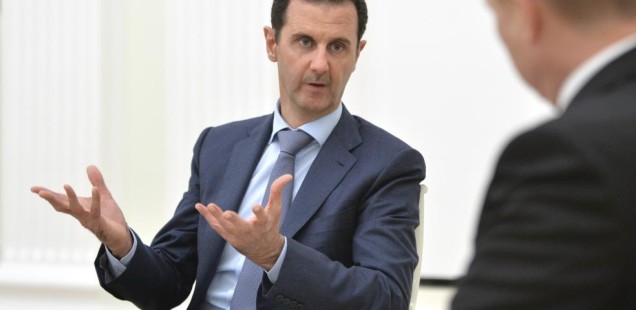
How Putin Put Obama in a Bind on Syria
As Russia’s advance into Syria proceeds, apparently with some early successes against key targets, it starts to look as if Moscow is using the Syria crisis to force the Obama administration into a bind.
On Saturday, Jordan agreed to cooperate with Russia on their various air and ground campaigns against Islamic terrorists in Syria. Jordan has been among Washington’s staunchest allies in the Middle East for decades, and this move makes them not only an ally of Russia in the fight against ISIS, but also of Iraq and Iran. Jordan is also part of the coalition the U.S. leads to carry out air strikes against Islamic State positions.
Related: 14 Deadly Weapons Russia Has Sent To Syria
The Obama administration’s pants just dropped a few more inches below its knees. It’s now perfectly evident that its default position is non-cooperation with Russia on any question and in any circumstance.
It’s not because of a Russia policy, a Syria policy or even a foreign policy of any kind. It’s the plot line in a black hats-white hats Hollywood Western; even old friends aren’t sitting still for it.
When Russia began its air campaign in Syria a few weeks ago, the pundits in Washington, egged on by administration officials, all wrung their hands as to President Putin’s true motives. The working assumption was they were sinister and, one-way or another, malevolent.
This view was always (1) simplistic and (2) embarrassingly wrong, as argued in this space from the first. Now consider Putin’s remarks last week at the Valdai Club, a Russian variant of the World Economic Forum held annually in Davos.
The Russian leader ranked the Syria crisis as the third significant chance to build a wide-ranging strategic partnership between Russia and the West—the first two being the Soviet Union’s collapse and the post-September 11 fight against Islamic extremism. Lamenting those failures, he said, “We should not miss the chance again.”
Related: Now We Know What Putin Is Up To In Syria
At this point, the more Russia reveals of its thinking on Syria, the more the more cringe making it is to watch the Obama administration cling to the line that if it’s Russia’s idea it’s a bad idea.
Sergei Lavrov, Putin’s foreign minister, gave an eventful speech as he convened with Secretary of State Kerry and the foreign ministers of Turkey and Saudi Arabia in Vienna last Friday. In an interview broadcast on Russian television Saturday, he repeated his two most startling points—both of which put the U.S. administration squarely on the spot.
One, he said Syria should begin now to prepare for national elections—presidential and parliamentary—as early as next year. This is in keeping with Moscow’s long-stated position that Syria’s future must finally be left to Syrians once some semblance of order is restored.
Note: Lavrov’s point on elections followed by a couple of days Syrian President Bashar al-Assad’s unannounced visit to Moscowfor talks with Putin. While the Kremlin has long backed new Syrian elections, “Lavrov’s comments were its most specific call for political renewal yet,” Reuters reported.
Related: Obama’s Syria Strategy: ‘Scrambling’ and ‘Desperate’ as Putin Takes Charge
Two, Lavrov also stated that Russian warplanes, which have so far flown nearly 900 sorties in Syria, are prepared to support rebels claiming membership in the U.S.-backed Free Syrian Army—if only the U.S. would tell the Russians where these rebels are. So far it refuses, and possibly for good reason.
The U.S. believes that the Russians are targeting the rebels purposefully in support of Assad. On September 30th, Russian aircraft bombed Syrian opposition fighters, some trained by the CIA.
The Reuters report described this as “a shift in Russia’s position,” but I don’t think so. Moscow still stands with many who maintain that there is little distinction between the FSA—such as it may be, and this is unclear—and any other Islamist militia active in Syria.
At this early moment, the offer to support the FSA appears to be more of a gesture to Washington. Or to put it another way, part of Moscow’s apparent determination to call Washington’s bluff.
And so it has. What a position the administration is in as of this weekend.
Are Obama’s people now going to stand against a proposal for internationally supervised elections in Syria? Are they going to object that Russia’s bombing America’s guys while declining to tell the Russians where these guys are?
Related: Putin Begins Bombing in Syria, but ISIS Isn’t His Only Target
The pundits and wise men, meantime, shift into high gear on the Syria question. Zbigniew Brzezinski, former U.S. National Security Advisor, thinks we should “disarm”—read attack—Russian naval and air facilities in Syria because “American credibility is at stake.” David J. Kramer, a former human rights expert in the State Department writes in The Washington Post that we should freeze the RT broadcasting network’s assets in the U.S. And Pavel K. Baev at The Brookings Institution wants to bomb Hezbollah, which is part of the anti-ISIS alliance.
It amounts to flailing on the opinion pages.
By contrast, consider Stephen M. Walt’s piece in the new edition of Foreign Affairs. Walt, a professor of international affairs at Harvard, points out that the Islamic State controls a GDP roughly equal to Barbados’s and is too weak to pose a serious, prolonged threat. A patient policy of containment is thus the wise policy, in Walt’s view.
“This hands-off approach requires American leaders to remain cool in the face of beheadings, terrorist attacks, the destruction of antiquities, and other provocations,” Walt concludes.
Sound thinking—somewhere, finally.

